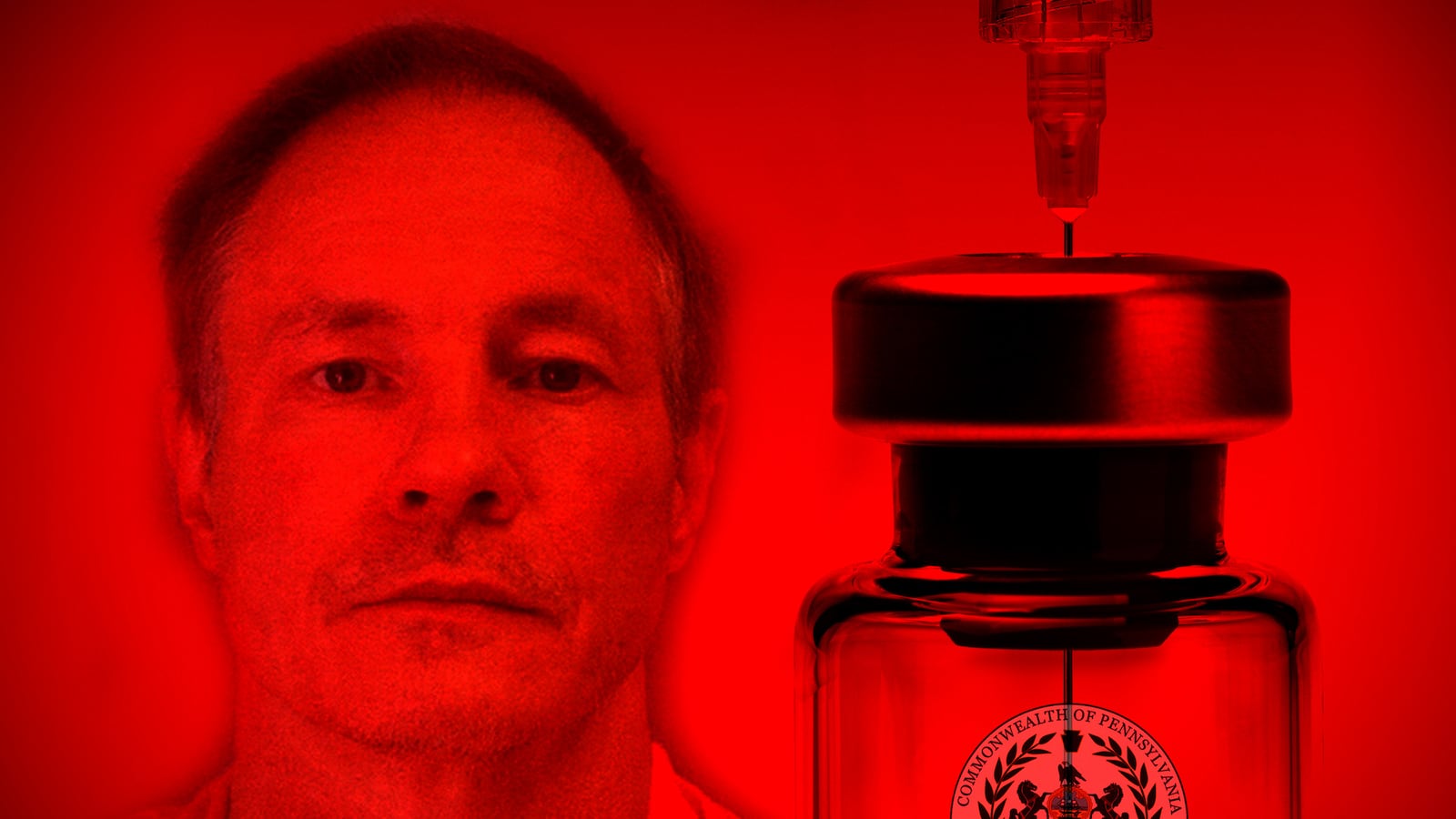Fifteen years after its last execution, Pennsylvania is finding it difficult to fire up its death machine again.
If the commonwealth gets its way, it will soon strap 58-year-old confessed murderer Hubert Michael Jr. to a gurney inside the State Correctional Institution at Rockview, insert an IV into his vein, and fill his body with lethal chemicals until his heart stops beating. There’s just one little problem. The Department of Corrections can’t seem to get its hands on the drugs it needs to do the job.
On Friday, Gov. Tom Corbett announced that he is postposing Michael’s September 22 execution because the department doesn’t have a stock of lethal chemicals on hand and is still seeking a supplier. Michael, who is rapidly approaching the end of his appeals, would be the first prisoner executed in the Keystone State since 1999, when a judge ruled that condemned torture-killer Gary Heidnik’s desire to end his own life could not be used as evidence of his mental incapacity.
The implications for Pennsylvania are great: The last time the commonwealth executed an inmate who hadn’t voluntarily waived his right to appeal, John F. Kennedy was president. Corbett is eager to break that streak. He’s signed 35 death warrants during his tenure in office, all of which have been stayed. And he has gone on record saying he is “committed to carrying out the sentence” against Michael.
Susan McNaughton, a spokeswoman for the Pennsylvania Department of Corrections, offered no explanation to The Daily Beast for the department’s trouble obtaining the drugs. She also declined to comment on speculation among some well-placed observers that the department has been turned down by at least one supplier, most likely the compounding pharmacy that provided the drugs the last time Michael was scheduled for execution, in November 2012.
“We have been and will continue to work to acquire the drugs in accordance with the law,” McNaughton said via email. “How long that will take, we do not know.”
In a case of conspicuous timing, the governor’s decision came one day after the American Civil Liberties Union and a group of newspapers filed a motion in federal court seeking information on what drugs the commonwealth will use on Michael and where it plans to get them. The petitioners are piggybacking on a class action suit filed in 2006, Chester v. Wetzel, that challenges Pennsylvania’s lethal injection protocol as unconstitutional because it lacks adequate protections against needless pain and suffering.
The most recent filing in the case seeks to unseal documents related to the Department of Corrections’ last lethal drug acquisition and lay the groundwork for similar transparency in all future executions.
Mary Catherine Roper, an ACLU attorney representing the newspapers, said the execution postponement caught her and her colleagues off guard.
“Nobody is surprised that it’s getting harder to locate these drugs,” she said, “but no one at the Department of Corrections had indicated publicly that they hadn’t been able to secure them.”
The department has not revealed which drug or drugs it is having trouble purchasing, but it’s a safe bet that at least one of them is the first drug administered during an execution, a sedative that is designed to render the condemned unconscious during the procedure.
Pennsylvania has conducted three executions by lethal injection since 1995, each time using a three-drug protocol that included the sedative sodium thiopental, followed by the paralytic pancuronium bromide, and potassium chloride, which stops the heart.
For all intents and purposes, sodium thiopental is now unavailable in the United States. In 2011 the European Union banned its export for use in capital punishment, and the sole U.S. manufacturer of the drug chose to stop making it rather than promise authorities in Italy—the site of a new manufacturing facility—that it wouldn’t be used in executions.
The Pennsylvania Department of Corrections amended its protocol accordingly to allow for a second sedative, pentobarbital—sold under the brand name Nembutal—to be used. But Lundbeck, the Danish maker of Nembutal, no longer sells the drug to U.S. prisons. A shortage of pentobarbital has forced some states to improvise, often with gruesome consequences.
Since January, at least three botched executions have been tied to the sedative drug midazolam, which states began incorporating as an alternative to pentobarbital as it became increasingly difficult to acquire.
McNaughton says Pennsylvania has no plans to modify its existing cocktail. That means it will need to get pentobarbital from a compounding pharmacy, another source of concern, experts say. Compounding pharmacies are not regulated by the Food and Drug Administration and have a track record of delivering low-quality and adulterated drugs.
Court transcripts made available by the Pennsylvania ACLU indicate that the drugs ordered by the Department of Corrections from an unidentified compounding pharmacy for Michael’s last scheduled execution contained lower concentrations of pentobarbital sodium than are found in brand-name Nembutal and were delivered in vials that did not adhere to standard color-coding protocols.
It’s worth noting that Hubert Michael Jr. is not innocent of his crime, nor does he claim to be. In 1993, while out on bail on a rape charge, he kidnapped a teenage girl named Trista Eng while she walked to work, drove her to a remote location with the intention of sexually assaulting her, and shot her to death. He pleaded guilty to first-degree murder and was sentenced to die. Some people would argue that’s a just penalty.
But the spectacle playing out on Pennsylvania is about more than one condemned inmate. Despite having the fourth-highest death row population in the country, Pennsylvania isn’t terribly good at carrying out the ultimate penalty. A third of the 184 inmates now on death row there received their sentences more than two decades ago, and at least 24 have died of natural causes before their sentences could be carried out.
Legal experts, including the American Bar Association, blame the poor state of inmate representation in capital cases.
For years there were no pre-qualifications for an attorney to handle capital cases in the commonwealth. And Pennsylvania is the only state in the nation that provides no post-conviction financial support for defense appeals, meaning defendants are typically required to turn to county services and the aid of less-than-able court-appointed attorneys. As a result, cases are often wildly mismanaged. Nearly as many death convictions are overturned in Pennsylvania as are handed down each year, the majority of them due to ineffective assistance of counsel.
Most Pennsylvanians now support a moratorium on capital punishment until its efficacy can be determined. Opponents of the death penalty see the state’s drug problem as a sign that that time has come.
“The mere fact that it’s so difficult to score these drugs spotlights how isolated we are from most of civilized society in our obsession with executing people,” said Kathleen Lucas, executive director of Pennsylvanians for Alternatives to the Death Penalty. “I doubt that any governor would want his or her legacy to be a torture session like those we’ve had recently in states like Oklahoma and Arizona.”
But Corbett’s legacy is not the only thing keeping him up at night. The governor’s prospects for reelection in November are already on shaky ground, and being forced to pull the plug on the state’s first execution in 15 years would be an embarrassment to his administration. His Democratic challenger, Tom Wolf, has promised to issue a moratorium on executions if elected. With Wolf leading by 24 points in the polls, Hubert Michael’s last hope of avoiding execution may come from the voting booth, not a courtroom.






